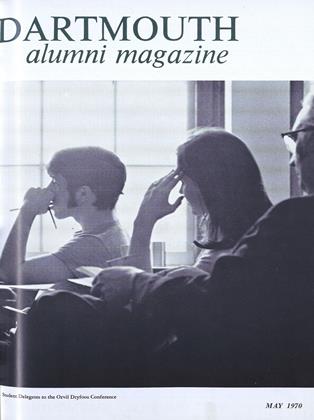Edited by Herbert L.Marx Jr. '37. New York: The H. W. Wilson Co., 1969. 215 pp. $3.50.
Developments in labor-management relations have been dominated in recent years by the efforts of government at all levels to devise a viable system of collective bargaining for public employees. What makes these experiments so fascinating is the attempt to demonstrate that the right to strike, contrary to the conventional wisdom, is not a prerequisite of free collective bargaining. Whether government in this endeavor has set itself a realistic goal is certainly debatable. That it has set itself an important task, however, is indisputable.
If current experiments confirm the traditional view that bargaining and strike rights are inseparable, then society faces a painful choice. It can agree to extend to the public sector the bargaining institutions and practices of the private sector, which means, among other things, abandoning the prohibition against strikes. Or it can jettison the notion that government workers should enjoy the bargaining rights accorded others and seek to contain the resulting conflict by repressive laws, which can only continue the recent dreary experience of unrest and disruption. Neither alternative is very appealing, though the former is perhaps at least tolerable. If, on the other hand, government is successful in fashioning a bargaining system whose procedures obviate the need for strikes, then it will have pioneered a major social innovation with revolutionary potential for the structuring of private collective bargaining and perhaps even of other basic processes of conflict resolution.
Considering the stakes involved in public bargaining, it is not surprising that a voluminous literature has grown up around the subject in only a very few years. Herbert Marx's slim volume of readings can offer no more than a small sample of that literature. Nevertheless, his selections are judicious and sensibly arranged, and a fine bibliography is appended for the reader who would pursue the subject further. Mr. Marx, as editor, has been careful not to interpose his own opinions or to offer his own solutions. He does ask the right questions, however, and he provides a framework and set of materials within which one can usefully ponder the answers.
Mr. Macdonald is Professor of BusinessEconomics at the Tuck School and has agolf handicap of 4 at the Hanover CountryClub.
 View Full Issue
View Full Issue
More From This Issue
-
 Feature
FeatureA CHANCE FOR THE PENTAGON TO HELP SOLVE SOME DOMESTIC AS WELL AS MILITARY PROBLEMS
May 1970 By GERALD G. GARBACZ '58 -
 Feature
FeatureThe Great Love Affair Between Students and Films
May 1970 By MAURICE H. RAPF '35 -
 Feature
FeatureProject IMPRESS
May 1970 By JOANNA STERNICK -
 Feature
FeatureStudent Views Feature Dryfoos Conference
May 1970 -
 Article
ArticleThe Undergraduate Chair
May 1970 By WINTHROP A. ROCKWELL '70 -
 Article
ArticleThe Faculty
May 1970 By WILLIAM R. MEYER
ROBERT M. MACDONALD
-
 Class Notes
Class Notes1921
January 1945 By CHARLES A. STICKNEY JR., ROBERT M. MACDONALD -
 Class Notes
Class Notes1921
March 1946 By CHARLES A. STICKNEY JR., ROBERT M. MACDONALD -
 Class Notes
Class Notes1921
October 1947 By DONALD G. MIX, ROBERT M. MACDONALD -
 Class Notes
Class Notes1921
March 1950 By DONALD G. MIX, ROBERT M. MACDONALD, ROGER C. WILDE -
 Class Notes
Class Notes1921
June 1951 By DONALD G. MIX, ROBERT M. MACDONALD, ROGER C. WILDE -
 Class Notes
Class Notes192l
December 1955 By REGINALD B. MINER, ROBERT M. MACDONALD, DONALD G. MIX, 1 more ...
Books
-
 Books
BooksAlumni Articles
OCTOBER 1967 -
 Books
BooksTHAYER SCHOOL REPORT ALUMNI FUND, 1941
April 1942 By F. H. Munkelt '08 -
 Books
BooksTHE UNITED NATIONS AND ECONOMIC AND SOCIAL CO-OPERATION.
October 1951 By M.O. CLEMENT -
 Books
BooksHUMANISM AND POLITICS. STUDIES IN THE RELATIONSHIP OF POWER AND VALUE IN THE WESTERN TRADITION.
JUNE 1969 By MAURICE MANDELBAUM '29 -
 Books
BooksCLINICAL ASPECTS AND TREATMENT OF SURGICAL INFECTIONS
March 1949 By Radford C. Tanzer '25. -
 Books
BooksThe Back of My Mind
DECEMBER 1966 By Ramon Guthrie


